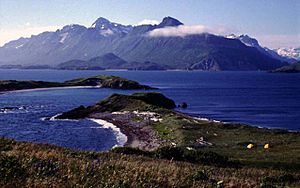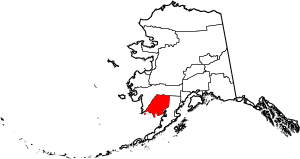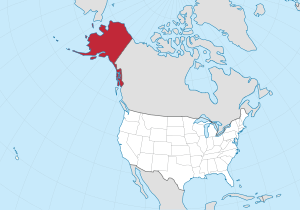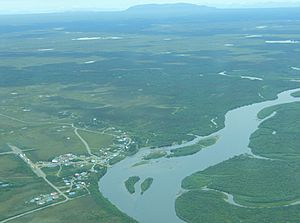Dillingham Census Area, Alaska facts for kids
Quick facts for kids
Dillingham Census Area
|
|
|---|---|

|
|

Location within the U.S. state of Alaska
|
|
 Alaska's location within the U.S. |
|
| Country | |
| State | |
| Established | 1980 |
| Largest city | Dillingham |
| Area | |
| • Total | 20,915 sq mi (54,170 km2) |
| • Land | 18,569 sq mi (48,090 km2) |
| • Water | 2,346 sq mi (6,080 km2) 11.2%% |
| Population
(2020)
|
|
| • Total | 4,723 |
| • Density | 0.26/sq mi (0.10/km2) |
| Time zone | UTC−9 (Alaska) |
| • Summer (DST) | UTC−8 (ADT) |
| Congressional district | At-large |
The Dillingham Census Area is a special part of Alaska, United States. It is called a census area because it doesn't have its own local government like a county. Instead, it's part of a larger "unorganized borough" in Alaska.
In 2020, about 4,857 people lived here. The biggest town in the area is Dillingham. It sits on a small arm of Bristol Bay, which is part of the Bering Sea.
Contents
About the Land
The Dillingham Census Area is very large! It covers about 20,915 square miles. Most of this is land (about 18,569 square miles). The rest, about 2,346 square miles, is water. That means about 11.2% of the area is covered by water.
Nearby Areas
The Dillingham Census Area shares borders with a few other areas in Alaska:
- Bethel Census Area, Alaska (to the west and north)
- Bristol Bay Borough, Alaska
- Lake and Peninsula Borough, Alaska (to the east)
Protected Natural Places
This area is home to some amazing natural spots that are protected:
- Alaska Maritime National Wildlife Refuge (part of it is in the Bering Sea)
- This includes Hagemeister Island.
- Togiak National Wildlife Refuge (a part of this refuge is here)
- This also includes a part of the Togiak Wilderness.
Who Lives Here?
| Historical population | |||
|---|---|---|---|
| Census | Pop. | %± | |
| 1960 | 4,024 | — | |
| 1970 | 3,485 | −13.4% | |
| 1980 | 4,616 | 32.5% | |
| 1990 | 4,012 | −13.1% | |
| 2000 | 4,922 | 22.7% | |
| 2010 | 4,847 | −1.5% | |
| 2020 | 4,857 | 0.2% | |
| 2023 (est.) | 4,607 | −5.0% | |
| U.S. Decennial Census 1790-1960 1900-1990 1990-2000 2010-2020 |
|||
The Dillingham Census Area has a small population spread out over a huge area. Many people who live here are Native American, especially from the Yupik and Eskimo groups. In fact, many people here speak Yupik or Eskimo at home.
The average age of people living here is about 29 years old. Many families have children.
Towns and Villages

The Dillingham Census Area has several small towns and villages. These communities are important for the people who live there.
Cities
Census-designated places
These are places that are like towns but are not officially incorporated as cities.
See also
 In Spanish: Área censal de Dillingham para niños
In Spanish: Área censal de Dillingham para niños
 | Kyle Baker |
 | Joseph Yoakum |
 | Laura Wheeler Waring |
 | Henry Ossawa Tanner |

